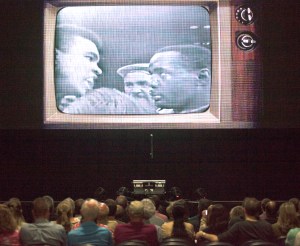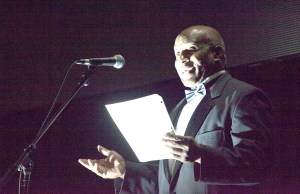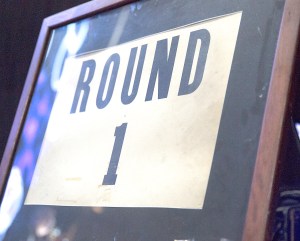The Phantom Punch at 50
New: Letter from Muhammad Ali to Lewiston | Interactive guide to our stories, photos, audio and video | Audio: Listen to the radio broadcast from the fight | Video: Can you see the punch? | Interactive timeline of the fighters’ careers | Newspaper coverage & readers’ memories from 1965
LEWISTON — The 50th anniversary of the Muhammad Ali, Sonny Liston fight was celebrated Monday night at the Androscoggin Bank Colisee with Raising Ali: A Lewiston Story. The story paralleled the famous heavyweight bout with the history of Lewiston from 1965 to present.
The premiere of the film was also being broadcast by Maine Public Broadcasting Network with a showing of the bout as it happened, mere feet away from observers, 50 years ago.
Director Gary Robinov said of the film, “It’s really kind of this beautiful little love letter to Lewiston.”
Robinov said, “It’s kind of a little look back to 1965 — what Lewiston was,” calling it “a thriving little town and then we kind of watch what happens when the circus comes to town for about two weeks and then the circus leaves and slowly over the next couple years, Lewiston starts to slide into decline when those jobs go away and we pause and look about for a minute but we quickly pick it back up and say where’s Lewiston today?”
“What are the struggles that they’ve overcome? What are the struggles they still face? Where are they headed?”
“So, hopefully it ends on a very high metaphorical note — Get up and fight, get up and fight — take control of your destiny — take control,” Robinov said, “don’t let these situations dictate to you where you need to be or who you are.”
Robinov was asked about the film’s parallel of social and racial tension in 1965 with Lewiston’s own experiences with the immigrant community over the past decade.
“We got a wonderful letter from the champ,” Robinov said. “Ali and his wife Lonnie watched the film and were very complimentary about it and they sent us a letter and it was nice that they pointed out those connections to the film too.”
Former mayor of Lewiston and Auburn, John Jenkins, read the letter for the audience.
“You’ve got to remember, it’s 1965 and the country was in a tremendous state of turmoil,” Robinov said. “The first troops were landing in Vietnam, “the race riots were starting to break out — we were seeing the march on Selma had happened a couple weeks earlier. “
“And here’s this 23-year-old young man who walks into the ring in Lewiston, Maine and announces himself as Muhammad Ali and he’s booed, He’s not welcomed here.”
The film painted Lewiston of 1965 as a very French Canadian, decidedly white bustling community of mills, entertainment and night life. It was the boom before the bust as locals recalled walking congested streets to Peck’s department store or one of the many thriving businesses along Main and Lisbon streets.
Robinov quoted someone: “Sonny Liston was happy sitting at the white man’s table and Muhammad Ali wasn’t.”
“He wanted to establish himself and when you come to Lewiston, Maine in 1965 that’s scary, that’s unnerving, that’s rattling” Robinov said, “yet, we look back on him today as the greatest — that’s how we know him.”
The first round ring card stood at the right corner of the stage — the only card needed after the knockout punch was delivered at 1 minute, 44 seconds into the round.
The footage of the bout shows television announcers still referring to the young heavyweight champion as Cassius Clay. Twice, Ali corrected them, only for the announcer to grudgingly refer to Ali by his Muslim name and “better known as Cassius Clay” thrown in for good measure.
“He will tell you that he has mellowed over time — he has found compromise in his heart,” Robinov said, “and then you look today at this community from the sub-Sahara, Somalian community who really are just struggling to make a better way for themselves, and they’ve had their struggles and the town’s had their differences.”
“If you go back to the ’30s, it’s the French Canadian immigrants — they were the ones that were shunned, they were the ones being abused by whoever it was,” Robinov said.
“So you look at this very proud French Canadian heritage and what it means to this town and the identity of this town and you understand that there’s some concern about losing themselves in this struggle but I think in talking to people if we had done this story eight years ago — 10 years ago, it would have been a much uglier ending to this film,” he said. “I think it ends on a really positive note of optimism and hope and cooperation and understanding and compromise.”
The film showed that side of Lewiston as well. Eric Agren of Fuel Restaurant on Lisbon Street said when he set up shop eight years ago, he remembers many boarded up storefronts.
Muhammad Ali’s Message to Lewiston





Comments are no longer available on this story